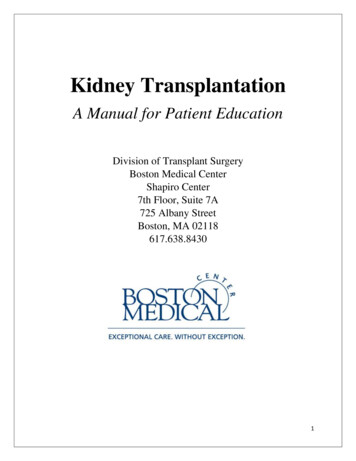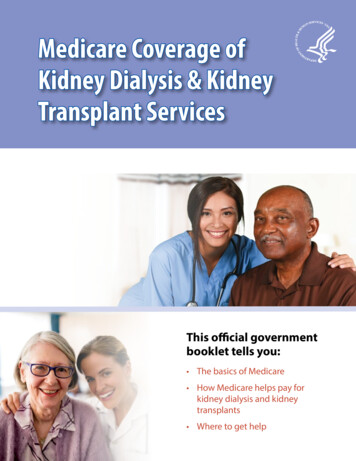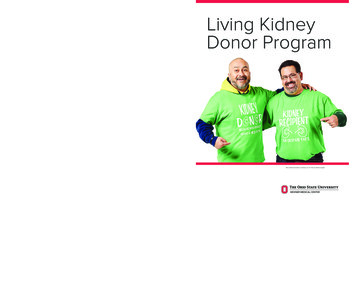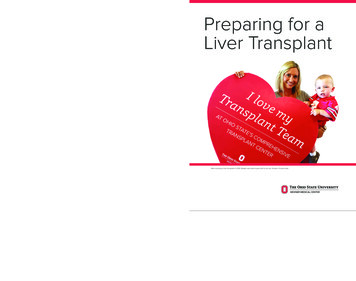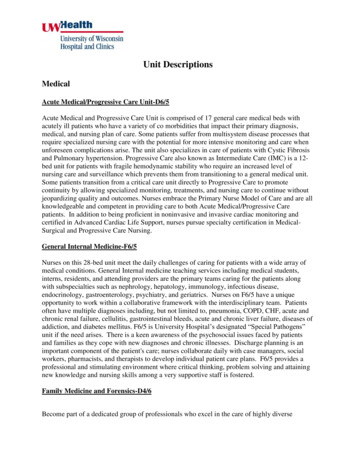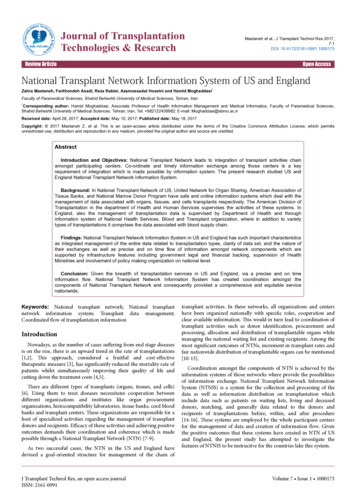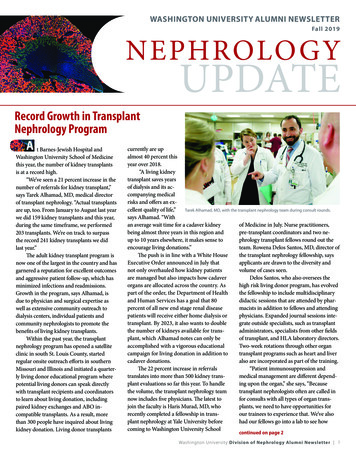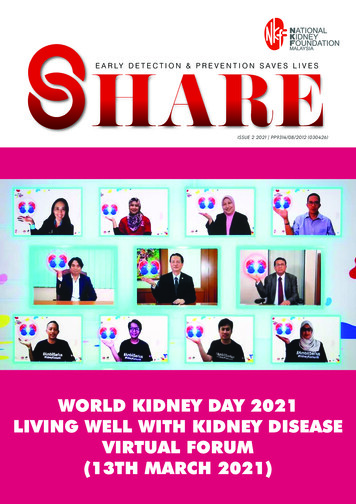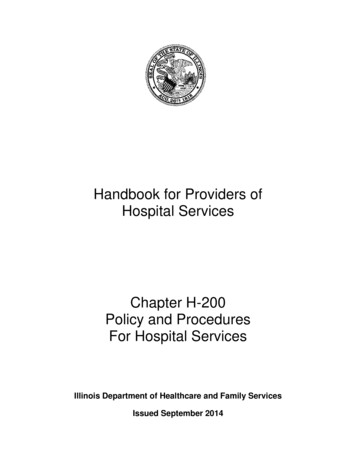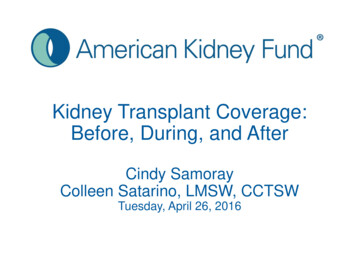
Transcription
Kidney Transplant Coverage:Before, During, and AfterCindy SamorayColleen Satarino, LMSW, CCTSWTuesday, April 26, 2016
Thank you to our speakers!Cindy SamorayTransplant Financial CoordinatorUniversity of Michigan TransplantCenterColleen Satarino, LMSW, CCTSWTransplant Clinical Social WorkerUniversity of Michigan TransplantCenter
What’s the scoop Our goal is to provide general information about the processand realistic costs of getting a kidney transplant. Referral to transplant center: evaluation and listingInsurance coverage Limitations Options Importance of life-long health and prescription coverage Living with your transplant: managing health care andprescriptions needs for your lifetime.
Referral to a transplant center Begins with contact from a variety of sources.– Local nephrologist––Dialysis center staffSelf-referral (call the center yourself) Specific steps transplant centers follow may vary but allrequire an insurance review.– Type of insurance: Does it work where you want to go?– Benefit levels (in or out of network)– Prior-authorization (is it needed?) Approval or denial of transplant evaluation: based on eitherinsurance or specific transplant center guidelines
Insurance review – What are your payment options? Employer Group Health Plan (EGHP)– Coverage available through your own, spouse or parents employer.– Current, retiree or COBRA (continuation of EGHP for specific time period) Government sponsored coverage– Medicaid– Medicare due to age, disability, or ESRD (end stage renal disease)– Tricare
Insurance review, cont’d Individual Health Plan– Self-employed or when EGHP is not available– Affordable Care Act (ACA) insurance plans availablethrough the healthcare exchange, marketplace Self-pay no insurance coverage:– Speak with the transplant center’s financial coordinator
Insurance review, cont’d How much you have to pay beyond what yourinsurance covers depends on your policy– Deductibles– Cost sharing known as co-insurance,– Maximum annual out-of-pocket depend on your plan Remember: medical providers usually will work out paymentplans.
In- or Out-of-Network Care Where you seek medical care and how much insurance pays maydepend on being in- or out-of-network Coverage is better when services are provided at in-network facilities. Be aware: when out-of-network benefits are available, you will never have100% coverage. Many insurance plans have networks You pay less out-of-pocket (OOP) when services are done in-network. Some may have NO out-of-network coverage, which can impact where youseek transplant care. 6,000 4,000 2,000 0Maximum imum OOP
Insurance PlansYou should know if your insurance plans have networks orcontracts, especially for transplant services. When discovered at referral before evaluation:– You may be required to seek services elsewhere Insurance changes can occur anytime during this journey– When found after evaluation, listed or even transplant:– You may need to change transplant centers No matter how small an insurance change looks to you– It’s extremely important to contact your financial coordinator BEFORE aninsurance change occurs.– You may have issues beyond different co-pays and deductibles that couldimpact your transplant.
Transplant network contracts Much more different than typical health plan in or outof-network benefit levels. Medical center is in network with health plan, but notcontracted for transplant services.– Insurance company will not allow transplant services, even when themedical center is in-network (Emergency, family care, nephrology, and other specialty services covered,but kidney transplant services are not.)
Transplant network contracts, cont’d. One of two outcomes when transplant network isinvolved:1. No coverage - absolutely nothing will be paid for at a noncontracted facility.2. Plan will allow evaluation-transplant but will pay at outof-network rates with additional limitations.
Prior-authorization Pre-authorization is sometimes necessary – the transplant centerwill call if you need it. Pre-authorization for each phase (evaluation, transplant listing,and post-transplant services) may be required If you aren’t familiar with the ins and outs of your coverage,including co-pays or deductibles, find out!Codes to share with your insurance company:Kidney: CPT 50360 * ICD10 - N18.9Kidney/pancreas: CPT 50360 and 48554 * ICD10 - E1021Ultimately YOU are responsible for your services and should be your own advocate.
Why haven’t they called? Reasons why an evaluation hasn’t been scheduled– Complicated insurance benefit process– Working with outdated information– Volume of referrals (an ugly truth) To avoid delays in the process, you can:– Confirm medical providers have current contact -insuranceinformation.– Call the transplant center yourself Answer your phone!– Listen carefully to voicemail messages– Return calls with the requested information. Be your own advocate!
Why was my evaluation denied? You will be told why your evaluation was denied. Depending onthe reason, you may try again. Remember: If transplant evaluation has been denied, lifesaving dialysis will not be!
Reasons your evaluation may have beendenied Insurance contract/network issue: coverage is available only atpreferred provider centers Little or NO transplant benefits available: insurance plans mayhave limitations. You will be notified and can consider self-pay. Lifestyle concern: documented non-compliance with medical care,nicotine, alcohol or drug abuse.– Decisions to deny evaluations for the reasons above can come from thetransplant center or your insurance plan. Medical comorbidity: other medical conditions that might preventa successful outcome
If your evaluation appointment is approved This gives an opportunity to learn if transplant ispossible.– Process steps vary depending on your center.– Typically all involve introduction to your transplant team.
What happens during theevaluation? A nephrologist and surgeon - examination and review of your past andcurrent medical history Nurse coordinator: transplant medical education and follow-up Social worker: meet with patient and support people to discuss preparationfor and life after transplant. Financial coordinator: insurance coverage review: current, future, possibleassess to ESRD (end stage renal disease)Medicare Dietitians may be available during evaluation and beyond. Medical testing: lab work, chest x-ray and EKG
After the transplant evaluation When will I learn if I am a candidate? Typically written responses are mailed within two-weeks ofyour evaluation Suitable medical transplant candidate to be listed or move forward withliving donor transplant Potential candidate for transplant pending additional medical testspsychosocial or financial clearance Not a candidate for transplant due to medical, psychosocial or financialconcerns If not a candidate, depending on the reason, you may be able to try again.
Finance How much does a kidney or kidney-pancreas transplantcost?– 334,300 estimated billed charges for kidney– 558,600 estimated billed charges for kidney-pancreas Total average estimated cost for services from pre-transplant tosix-months post-transplant, including immunosuppressantmedication. (Hanson and Bentley, 2014)Bentley, T. Scott, FSA and Steven G. Hanson, ASA. "2014 U.S. Organ and TissueTransplant Cost Estimates and Discussion." Milliman.com. Milliman, 30 Dec. 2014. Web.20 Mar. 2016.
Do I have to pay that much? Not if you have health insurance Annual out-of-pocket expense (beyond insurance premiums)maximums vary depending on your insurance coverage*** Between zero and a few thousand *** Yes, if you have no health coverage– Be mindful this is an estimated-average: complicationscould significantly increase the cost*** Transplant center may offer discounts for self-pay ***
Prescription Costs Without Rx-coverage: between 5000 and 13000 is theestimated annual cost* for immunosuppressant. With Rx-coverage, monthly cost may not be that differentafter transplant, Valcyte being an exception.EGHP sponsored Rx benefits:Generic copays: 5 and 20Brand name copays: 20 and 100Medicaid Rx benefits:Minimal: 1 and 10* Yen, Eugene F., Karen Hardinger, Daniel C. Brennan, Robert S. Woodward, Niraj M. Desai, Jeffrey S. Crippin, Brian F. Gage, and Mark A. Schnitzler. "Cost-Effectiveness ofExtending Medicare Coverage of Immu nosuppressive Medications to the Life of a Kidney Transplant." Am J Transplant American Journal of Transplantation 4.10 (2004): 1703708. Food and Drug Administration. Web.
Prescription Costs ACA-Exchange (Rx – Medical combined)– Must pay full price until deductible is met– Deductibles between 500 and 5000– Once met 100% for the balance of benefit year Medicare part D Rx:– Routine medications may always have 4 copays– Class IV and V medications without extra help: Copays may range between 25 and 50% 200, 500, 900, 1800 are possible Valcyte is class V, will temporarily have high copay– Class IV and V medications WITH extra help Copays between 4 and 8
ESRD Medicare part B coverage forimmunosuppressants (immuno’s) A tremendous benefit, and solid reason to enroll in Medicare When Medicare effective is before or begins the month of transplant:Part B Medicare (NOT part D) will pay 80% of those immunosuppressantmedications. EGHP primary with Medicare secondary:Part B will pay 80% of the EGHP Rx copay: you pay even less for immuno’s Medicare primary with EGHP or supplement secondary:Part B pays 80% second bill 20% - you may have 100% cover immuno’s When Medicare effective date is AFTER month of transplant:Part B will not pay for immuno’s , coverage would be in Part D will with muchhigher copays
Other sources for Rx coverage Veterans Administration (VA)– VA (exclusive) will complicate transplant discharge– When eligible accessing Part D is recommended Indian Health Services (IHS)– IHS (exclusive) will complicate transplant discharge– When eligible accessing part D is recommended Part D Medicare:When you already have Rx coverage through EGHP(when eligible for ESRD Medicare) you should not purchase a part Dprescription plan – it may cancel EGHP Rx benefits.
Medicare and kidney failure:how does that affect me? Three reasons for Medicare: age, disability and ESRD.– The ESRD Medicare has been evolving since its 1972 introduction and isavailable for all eligible and qualified persons on dialysis or after kidneytransplant.– ESRD Medicare doesn’t replace existing EGHP and you don’t have to bedisabled to access ESRD entitlement. Already on Medicare due to age or previous disability– (disability NOT directly related to dialysis) You’re covered, no need to apply for anything new– Coordination-of-benefits (COB) changes may apply but coverage will notend!
When can I have ESRD Medicare and will it end? ESRD Medicare effective date depends on eligibility– Hemodialysis, peritoneal dialysis, kidney transplant– Coverage will be available throughout your entitlement– While on dialysis and up to three years post-transplant ESRD Medicare is a safety-net that can and will end– (except for those with age or non-dialysis-related disability) ESRD entitlement ends three-years after successful transplant– Future planning will be necessary to prepare if ESRD Medicare ends and is yourprimary source of coverage.– Return to work, job retraining, school
ESRD Medicare Qualification Qualification is based on citizenship, permanent residentstatus and paying FICA (Federal Insurance ContributionsAct) taxes.– FICA taxes are paid together with your employer, or paid entirely bythose self-employed. If you have consistently worked – paid taxes– you qualify for this benefit You didn’t work or pay taxes but your spouse did– you may qualify through spouse work history Children up to age 22 may qualify through eligible parent
ESRD Medicare Qualification Medicare parts A and B are the original health-coverage package.– Part A pays in-patient facility services, less an admission deductible In almost all cases there is NO monthly premium for part A– Part B pays out-patient facility charges, physician’s charges, andimmunosuppressant medications, less annual deductible always at 80% IN ALL CASES there is a monthly premium for part B Medicare To learn if you qualify for ESRD Medicare contact the Social SecurityAdministration at 800-772-1213 and ask.
Always a premium?Tell me how much and when do I pay? How much you pay is based on your income. When, how you pay depends on age or disability(monthly premiums deducted from your income) ESRD only (you will be billed quarterly.)If your yearly income in 2014 (for what you pay in 2016) wasFile individual tax returnFile joint tax returnFile married & separate tax returnYou pay (in2016) 85,000 or less 170,000 or less 85,000 or less 121.80above 85,000 up to 107,000above 170,000 up to 214,000Not applicable 170.50above 107,000 up to 160,000above 214,000 up to 320,000Not applicable 243.60above 160,000 up to 214,000above 320,000 up to 428,000above 85,000 and up to 129,000 316.70above 214,000above 428,000above 129,000 389.80*(n.d.). Retrieved April 8, 2016, from b-costs/part-b-costs.html
I have health insurance already.Do I need Medicare too? Yes, you should access this benefit if eligible. (If only to serve as asafety-net: other health insurance ends: job loss, death (insured), divorce, childaging out of coverage through parent.) When it’s best to access this safety-net will vary. (Discuss insuranceoptions and additional ESRD details with your dialysis or transplant unitfinancial coordinator.)
I have health insurance already.Do I need Medicare too? A few facts to consider:– Who’s on first: 30-month coordination benefits and EGHP coverage Medicare pays on balances left by EGHP; EGHP pays on balances left byMedicare– ESRD Medicare (even with the monthly premium) can save you money Annual cost of Part B is often less than annual EGHP plan deductible – copaymaximums– NON coordination between Medicare and ACA-marketplace coverage One DOES NOT pay balances left by the other. No opportunity to save money NO other diagnosis or transplant type allows immediate access to thisbenefit.
Medicare alone is NOT enough coverage for atransplant Additional coverage is needed because:– Part A does not pay 100%: deductibles and other cost sharing is required– Part B only pays 80%: significant out of pocket expense is left to the patientwithout a supplement (medi-gap) policy.
Medicare alone is NOT enough coverage for atransplant What more is needed?– Supplement (medi-gap) Health plan to pay what A & B does not: More options when over 65 Options when under 65 more limited Medicaid - Spend down Medicaid– Part D for Rx-coverage when no EGHP or other reliable source Many options regardless of age– What if I can’t get a supplement plan? Medicare advantage plan may be available
Medicare Advantage plans:What are they? Do I need one? If possible, avoid Medicare Advantage plans– Medicare Advantage plans provide parts A, B, medi-gap and part Dcoverage.– Medicare Advantage, HMO and PPO plans often advertised to cost lessfor full coverage.
Why avoid Medicare Advantage Plans? Often subject to networks and contracts (limits personalchoice) with no benefits outside that network Lower monthly premiums (you still must pay part B premium)often mean significantly higher deductibles, co-pays, and costfor immunosuppressants My retirement health benefit requires an Advantage plan– Typically the employer sponsored advantage plan has much bettercoverage than individual plans Dual entitled: Medicare and Medicaid may be required toenroll.
ESRD Medicare re-cap Not everyone qualifies and you cannot apply until AFTERdialysis or transplant have occurred– Medicare due to age or disability (disability not only dialysis related) orbecome age or disability eligible during this process Your coverage will not end!– ESRD only Medicare: coverage may end three years post-transplant.– If coverage was activated at the time of transplant: benefits ofMedicare part B (covering immunosuppressants) will return whenentitled again to Medicare through age or disability
ESRD Medicare re-cap Medicare Advantage Plans: avoid when possible Valuable option when its the ONLY game in town Medicare part D needed when EGHP option notavailable
Financial Roadblocks to Transplant Not eligible for Medicare– Self employed and never paid FICA taxes– Not enough work credits or not current work creditsHow to resolve: Seek employment with health benefits If self employed: begin to pay FICA taxes Enroll in spouse EGHP, if available Apply for Medicaid Purchase an ACA plan Medicaid spenddown– May not be adequate coverage for transplantationHow to resolve: Discuss your spenddown amount with your transplant financialcoordinator
Financial Roadblocks to Transplant Lawful permanent resident (aka Green card holder, Permanentresident alien)– � sent-immigrantsHow to resolve: Medicaid: Residency in the US for 5 years Medicare: Residency in the US for 5 years and 10 years of work history Undocumented immigrants– Emergency Medicaid only will cover emergency dialysis withoutresidency or citizenship– No coverage for transplantation through emergency MedicaidHow to resolve: Work on immigration status
Financial Assistance from theAmerican Kidney FundPremium assistance for low-income dialysis patients to cover: Part B Medicare Medicare secondary supplement Commercial plans (including Marketplace) Employer group health plans COBRA plans Medicaid (in states where there is premium cost-sharing)Other assistance offered by AKF Safety net 100 grants (transportation, medical supplies, etc.) Prescription assistance Disaster relief grants Summer enrichment program for childrenwww.kidneyfund.org
Why fundraise for transplant? To help cover out of pocket medical expenses– Annual insurance deductibles– Monthly insurance premiums– Medication and clinic copays To help cover transportation and lodging expenses to get tothe transplant center To help cover living expenses when a patient is recoveringfrom transplant surgery
Transplant fundraising organizations National Foundation for Transplants (NFT)– www.transplant.org– 800-489-3863 HelpHopeLive (formerly NTAF)– www.helphopelive.org– 800-642-8339 Children’s Organ Transplant Association (COTA)– Fundraising assistance for children, young adults and adults with geneticdisorders (polycystic kidney disease)– www.cota.org– 800-366-2682 Benefits of these nonprofit organizations:– Contributions are tax deductible for the individuals donating– Contributions on a patient’s behalf to a nonprofit organization are notconsidered income for the patient and will not then impact Medicaid
National Living Donor Assistance Center Federal grant designed to “reduce financial disincentives toliving donation” Financial assistance for travel and subsistence expensesassociated with living organ donation Living donor and recipient must both meet financialguidelines Available through your transplant center recipient or livingdonor social worker www.livingdonorassistance.org
Crowdfunding(Not tax and asset protected) Rising in popularity Online focus – appears quick and easy Examples: GoFundMe and GiveForward Understand the risks and costs– Research the fee structure– Income from crowdfunding is treated as income and can impact yourincome taxes and Medicaid eligibility
Now you are “on the list”Remember to keep in touch with: Transplant nurse coordinator about medicalchanges Transplant center financial coordinator if yourinsurance changes Transplant social worker if you are worried aboutcoping with transplant or about difficulties withsupport or transportation Transplant or dialysis dietician about maintainingweight or improving food choices
Congratulations!You just had a transplant1. Give yourself time to rest and heal from your surgery2. Learn your new medications3. Enroll in Medicare if not already enrolled- your transplantcenter will help you with the process4. Reach out to your transplant team with any question or ifyou need support during your recovery
During transplant surgery recovery:additional costs of transplant careAdjusting to the cost of medications and frequent visitsduring the first few months after transplant: Weekly clinic visits – visit copaysIncreased number of medications – medication copaysValcyte, if needed can be expensiveTransportation and lodging costsLost wages, especially difficult for self-employed patients FUNDRAISING CAN HELP WITH THESE COSTS
How to maintain long termtransplant kidney healthRemember, ESRD Medicare ends after 36 months post transplant so you need a plan! Use the three years of the ESRD Medicare benefit to consideryour options and take action:– Ask your doctor if you can return to previous work. Consider othertypes of employment if needed.– “Retool” for other employment through training programs or highereducation GOAL: Have an insurance plan in place so that there are nogaps in your ability to access immunosuppression andmedication––––EGHPACA planSpouse insuranceMedicaid
How to maintain long termtransplant kidney health Life changes may impact access to insurance, prescriptions, andtransplant centers MarriageMoving houseLoss of job/change of jobTransplant center not in networkChild becoming an adultDivorceDeath of a spouseUnable to work – pending disability Contact your transplant center if any life event changes occurthat impact your insurance and access to medication and care– Your transplant center will actively work with you to find a solution
If you are withoutimmunosuppressant medication Call your transplant center to work on a short termand long term plan. Short term options:– Prescription Assistance Plans– Free Copay cards – 30 days of brand name meds– Hospital charity programs Long term options:– Return to work– ACA plans– Medicaid
Conclusion Communicate all insurance changes with yourtransplant center financial coordinator Understand what federal or state program youare eligible for and when they may end Your transplant center should be your first call ifyou find yourself unable to accessimmunosuppressant medication or medical care Take responsibility for knowing your insuranceand planning ahead You are your best advocate!
Thank you!Questions?
Join us for next month’s webinar!Living with Chronic Kidney Disease: The ups,downs, and all aroundsTiffany Washington, Ph.D., M.S.W.Tuesday, May 17, 20161:00-2:00 p.m. (ET)Go to www.KidneyFund.org/webinars tolearn more and register!
Codes to share with your insurance company: Kidney: CPT 50360 * ICD10 - N18.9 Kidney/pancreas: CPT 50360 and 48554 * ICD10 - E1021 Ultimately YOU are responsible for your services and should be your own advocate. Why haven't they called?
